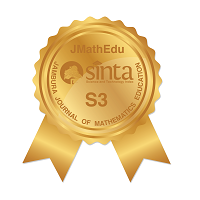Kemampuan Berpikir Kreatif Matematis Ditinjau dari Self-Esteem pada Model PBL dengan Pendekatan STEAM
Abstract
Keywords
Full Text:
PDFReferences
R. W. Utami, B. T. Endaryono, and T. Djuhartono, "Kemampuan Peserta Didik Dalam Menyelesaikan Soal Cerita Matematika" Fakt. J. Ilm. Kependidikan, vol. 5, no. 3, pp. 187-192, 2018.
E. Surya and E. Syahputra, "Improving High-Level Thinking Skills by Development of Learning PBL Approach on the Learning Mathematics for Senior High School Students" vol. 10, no. 8, pp. 12-20, 2017, doi: 10.5539/ies.v10n8p12.
H. Retnawati, H. Djidu, Kartianom, E. Apino, and R. D. Anazifa, "Teacher's knowdledge about higher-order thinking skills and its learning strategy" Probl. Educ. 21st Century, vol. 76, no. 2, pp. 215-230, 2018.
S. Xie and J. Cai, "Teachers ' Beliefs about Mathematics , Learning , Teaching , Students , and Teachers : Perspectives from Chinese High School In-Service Mathematics Teachers" Int. J. Sci. Math. Educ., 2020.
E. M. Mursidik, N. Samsiyah, and H. E. Rudyanto, "Analisis Kemampuan Berpikir Kreatif Siswa SD Dalam Memecahkan Masalah Matematika Open-Ended Ditinjau Dari Tingkat Kemampuan Matematika" J. LPPM, vol. 2, no. 1, pp. 1-13, 2014.
Sudianto, Dwijanto, and N. R. Dewi, "Students' Creative Thinking Abilities and Self Regulated Learning on Project -Based Learning with LMS Moodle" Unnes J. Math. Educ. Res., vol. 8, no. 1, pp. 10-17, 2019.
I. Trisnawati, W. Pratiwi, P. Nurfauziah, and M. R, "An alisis Kemampuan Berpikir Kreatif Matematis Siswa SMA Kelas XI pada Materi Trigonometri ditinjau dari Self Confidence" JPMI J. Pembelajaran Mat. Inov., vol. 1, no. 3, pp. 383-394, 2018.
R. Hu, Y.-Y. Wu, and C.-J. Shieh, "Effects of Virtual Reality Integrated Creative Thinking Instruction on Students' Creative Thinking Abilities" Eurasia J. Math. Sci. Technol. Educ., vol. 12, no. 3, pp. 477-486, 2016.
H. Sugilar, "Meningkatkan Kemampuan Berpikir Kreatif dan Disposisi Matematik Siswa Madrasah Tsanawiyah Melalui Pembelajaran Generatif" J. Ilm. Progr. Stud. Mat. STKIP Siliwangi Bandung, vol. 2, no. 2, pp. 156-168, 2013.
Herayani, Kartono, and Sukestiyarno, "Analisis Berpikir Kreatif Matematis Dan Karakter Rasa Ingin Tahu Pada Pembelajaran SSCS Berbantuan Media Puzzle Materi Pecahan" J. Prim. Educ., vol. 4, no. 2, pp. 96-103, 2015, doi: 10.15294/jpe.v4i2.10088.
M. A. Andiyana, R. Maya, and W. Hidayat, "Analisis Kemampuan Berpikir Kreatif Matematis Siswa Smp Pada Materi Bangun Ruang." JPMI J. Pembelajaran Mat. Inov., vol. 1, no. 3, pp. 239-248, 2018.
I. Alifiani, Dwijanto, and A. N. Cahyono, "Mathematical Creative Thinking Ability Viewed By Self -Esteem In Problem - Based Learning With Open Ended Approach" Unnes J. Math. Educ. Res., vol. 8, no. 2, pp. 195-202, 2019.
C. S. Ugwuanyi, C. I. O. Okeke, and C. G. Asomugha, "Prediction of learners' mathematics performance by their emotional intelligence, self-esteem and self-efficacy" Cypriot J. Educ. Sci., vol. 15, no. 3, pp. 492-501, 2020.
Nabila and Widjajanti, "Self-esteem in mathematics learning: How to develop it through contextual teaching and learning approach?" J. Phys. Conf. Ser., vol. 1581, pp. 1-7, 2020.
M. Rizqi, H. Suyitno, and D. Dwijanto, "Students' Mathematical Creative Thinking Ability in terms of Learning Styles and Gender in Problem Based Learning" Unnes J. Math. Educ. Res., vol. 10, no. 1, pp. 24-34, 2021.
K. E. Lestari and M. R. Yudhanegara, Penelitian Pendidikan Matematika. Bandung: PT Refika Aditama, 2017.
M. Gettings, "Putting It All Together: STEAM, PBL, Scientific Method, and the Studio Habits of Mind" Art Educ. Policy Rev. J., vol. 69, no. 4, pp. 10-11, 2016.
M. LaForce, E. Noble, and C. Blackwell, "Problem-Based Learning (PBL) and Student Interest in STEAM Careers: The Roles of Motivation and Ability Beliefs" Educ. Sci, vol. 7, no. 92, pp. 1-22, 2017.
Parno, L. Yuliati, F. M. Hermanto, and M. Ali, "A Case Study On Comparison Of High School Students' Scientific Literacy Competencies Domain In Physics With Different Methods: PBL-STEAM Education, PBL, And Conventional Learning" J. Pendidik. IPA Indones., vol. 9, no. 2, pp. 159-168, 2020.
J. W. Creswell, Research Design (Pendekatan Kualitatif, Kuantitatif, dan Mixed). Yogyakarta: Pustaka Pelajar, 2009.
Wahyuni, K. Kartono, and D. Dwijanto, "Keefektifan Pembelajaran PBL Pendekatan Kontekstual pada Pencapaian Kemampuan Pemecahan Masalah Siswa" in Prosiding Seminar Nasional Matematika (PRISMA), 2017, pp. 29-37.
R. Cahyaningsih and M. Asikin, "Komparasi kemampuan berpikir kreatif matematis siswa menggunakan pembelajaran matematika humanistik dan problem based learning dalam setting model pelatihan innomatts" J. Nalar Pendidik., vol. 3, no. 1, 2015.
I. A. Nugroho, M. Chotim, and Dwijanto, "Keefektifan Pendekatan Problem Based Learning Terhadap Kemampuan Berpikir Kreatif Matematik" Unnes J. Math. Educ., vol. 2, no. 1, pp. 50-54, 2013.
R. Y. Fitri, "The effect of problem-based learning model ( PBL ) and adversity quotient (AQ) on problem-solving ability" Am. J. Educ. Res., vol. 5, no. 2, pp. 179-183, 2017.
N. Happy and D. B. Widjajanti, "Keefektifan PBL Ditinjau Dari Kemampuan Berpikir Kritis dan Kreatif Matematis, Serta Self-Esteem Siswa SMP" J. Ris. Pendidik. Mat., vol. 1, no. 1, pp. 48-57, 2014.
A. Manches and L. Plowman, "Computing education in children's early years: A call for debate" Br. J. Educ. Technol., vol. 48, no. 1, pp. 191-201, 2017.
DOI: https://doi.org/10.37905/jmathedu.v4i2.20395
Refbacks
- There are currently no refbacks.
Copyright (c) 2023 Jambura Journal of Mathematics Education

This work is licensed under a Creative Commons Attribution-NonCommercial 4.0 International License.
Jambura Journal of Mathematics Education has been indexed by:
EDITORIAL OFFICE OF JAMBURA JOURNAL OF MATHEMATICS EDUCATION |
 | Department of Mathematics, Universitas Negeri Gorontalo Jl. Prof. Dr. Ing. B. J. Habibie, Moutong, Tilongkabila, Kabupaten Bone Bolango, Gorontalo 96554, Indonesia |
 | Email: [email protected] |
 | +6285255745923 (Call/SMS/WA) |
 | Jambura Journal of Mathematics Education (JMathEdu | eISSN: 2721-7477) by Department of Mathematics Universitas Negeri Gorontalo is licensed under a Creative Commons Attribution-NonCommercial 4.0 International License. Powered by Public Knowledge Project OJS. |



















